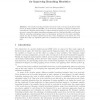Free Online Productivity Tools
i2Speak
i2Symbol
i2OCR
iTex2Img
iWeb2Print
iWeb2Shot
i2Type
iPdf2Split
iPdf2Merge
i2Bopomofo
i2Arabic
i2Style
i2Image
i2PDF
iLatex2Rtf
Sci2ools
SAT
2004
Springer
2004
Springer
Using Rewarding Mechanisms for Improving Branching Heuristics
The variable branching heuristics used in the most recent and most effective SAT solvers, including zChaff and BerkMin, can be viewed as consisting of a simple mechanism for rewarding the variables participating in conflicts during the search process. In this paper we propose to extend the simple rewarding mechanism used in zChaff and BerkMin, and develop different rewarding mechanisms based on information provided by the search algorithm, namely the size of learned clauses and the size of the backjumps in the search tree. The results show that very significant gains can be obtained for real-world problem instances of SAT.
| Added | 02 Jul 2010 |
| Updated | 02 Jul 2010 |
| Type | Conference |
| Year | 2004 |
| Where | SAT |
| Authors | Elsa Carvalho, João P. Marques Silva |
Comments (0)

